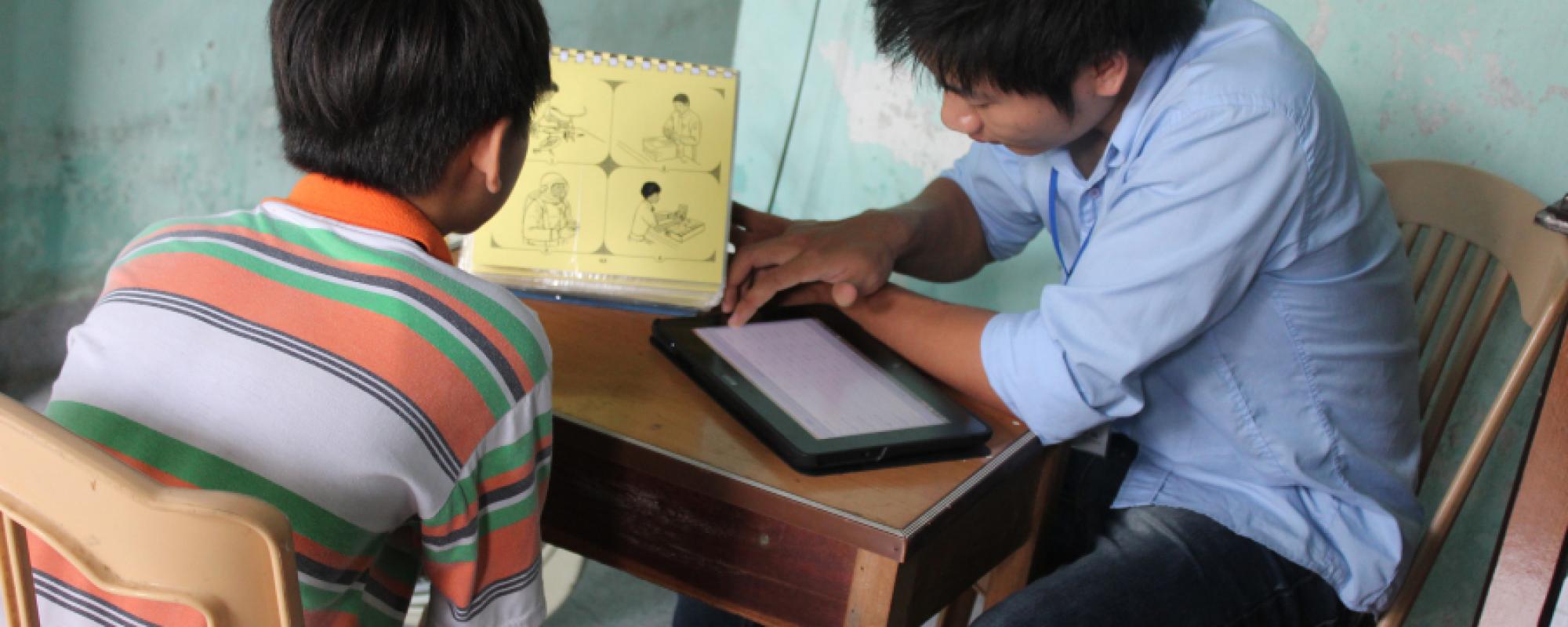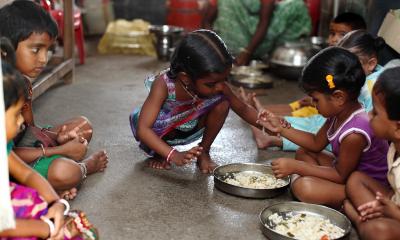
The Young Lives team take a positive view of research ethics as enabling high-quality research, and we have developed a shared understanding of research ethics. Our approach to ethics has been developed collaboratively with our research teams, following fieldworker training, piloting and reports from fieldworkers after each round of visits to our respondents. It has also evolved according to the changing environment and circumstances in which we are conducting our research.
The original proposal for Young Lives was checked against the ethics standards of its six original partner institutions, and received approval from the London School of Hygiene and Tropical Medicine ethics committee.
Young Lives has subsequently received approval before each pilot and round of data collection from the Central University Research Ethics Committee (CUREC) at the University of Oxford and each one of the study countries, as follows:
- Instituto de Investigación Nutricional (IIN), Peru (since 2002)
- Hanoi School of Public Health Research (since 2015)
- Centre for Economic and Social Studies (CESS) Hyderabad (since 2015)
- Ethiopia: College of Health, Addis Ababa University (since 2015).
Young Lives uses the following research ethics guidance:
- Central University Research Ethics Committee (CUREC) best practice guidance
- Department of International Development, University of Oxford
- Association of Social Anthropologists of the Commonwealth
- Save the Children Child Protection Policy.
Young Lives’ approach to obtaining informed consent has remained consistent over the years and has emphasised respect for participants’ dignity, anonymity, confidentiality, children’s views, and voluntary participation (Morrow 2009). In its initial rounds, Young Lives obtained informed consent from everyone involved - children, young people, caregivers (including in certain situations, young women's mothers/fathers in-law), and others in the community. Starting from Round 6 (2020) for the Younger Cohort and Round 5 (2016) for the Older Cohort, informed consent has been obtained directly from the Young Lives participants who are now adults.
Consent protocols are published together with our publicly archived data and are available as documentation from UK Data Service.
“The context of ethics and safeguarding has changed considerably in the last few years, with numerous implications for Young Lives practice. Young Lives has faced and dealt with many safeguarding challenges over the years, even though the concept of ‘safeguarding’ was not well developed in the early stages of the study. Young Lives has also tried to be attentive to fieldworkers’ well-being. Safeguarding now subsumes child protection, and extends understanding, practices, and requirements in complex ways (see Bond n.d.; UKCDR 2020). New safeguarding rules also require multiple protocols from researchers and project administrators, which impinge on relationships with partners, potentially creating tensions in pre-existing relationships based on mutual trust. Young Lives has tried to adhere to robust and consistent protocols as far as possible” (Crivello & Morrow, 2021)
Within Young Live’s work, we understand safeguarding as protecting people, including children and at risk adults, from harm that arises from coming into contact with our staff or programmes. Safeguarding, therefore, describes the steps taken to protect Young Lives study participants, staff and others who are involved in any way with Young Lives. While safeguarding principally refers to the prevention of harm, it also encompasses practices to handle incidents and complaints, together with processes for dealing with the observation by our fieldwork staff of actual or suspected abuse, and other forms of harm.
For Young Lives, Safeguarding means:
- Ensuring that Young Lives people behave professionally, courteously and with respect to all Young Lives study participants, their families and communities, at all times.
- Ensuring that there are good systems in place, both in study countries and in Oxford, for dealing with any Safeguarding incidents or concerns.
- Ensuring all Young Lives staff deal appropriately with instances of observed or suspected abuse they may encounter in the course of their work, including providing an appropriate response and support to victims of observed or suspected abuse.
Young Lives' Safe Guarding Policy in brief
The Safeguarding Policy sets out the commitments made by Young Lives and informs all Young Lives people of their safeguarding responsibilities.
Key aspects of the policy include:
- Ensuring all participating organisations maintain an appropriate organisational culture.
- Establishing appropriate systems of governance and reporting.
- Identification and management of risks.
- Establishment of best-practice policies and procedures, including:
- Young Lives Code of Conduct
- ‘Whistleblowing’ Policy - Training of staff, in particular regarding handling and reporting of incidents and allegations, and working with other organisations.
The key aspects of the Young Lives Safeguarding Policy are captured by ensuring that:
- Young Lives staff conduct themselves appropriately at all times, and
- Young Lives staff are trained in how to report incidents or concerns, however these may arise.
Duty of Care
During fieldwork, our fieldworkers listen to the struggles and challenges that our participants have faced or are facing.
Our fieldwork teams are trained to detect and identify ethical cases and follow specific protocols according to the urgency or severity of the case, which is assessed based on the imminent risk to life, health and/or integrity of the person or household. Each case is documented in detail by our fieldwork staff, following our reporting form. The protocol is, when applicable, to provide guidance to the families so that they can use public services available for them in their communities. Serious cases are reported to the central level to decide if any quick action is needed to reduce the risks.
Protecting Fieldworkers
Young Lives' Safeguarding Policy includes an important focus on fieldworkers’ well-being and safety. Psychological screening of fieldworkers was introduced in some countries but was difficult to sustain due to the high cost. Some teams hired psychologists to support fieldworkers in times of difficulty.
“Physical and psychological safety of researchers and fieldworkers: A potential psychological risk to fieldworkers does exist: in case of very upsetting cases debriefing sessions will be organized with the Fieldwork Co-ordinator. Furthermore, during regular debriefs the Fieldwork Co-ordinator will make sure to check on the stress levels of the enumerators. The PI has the responsibility to check on the Fieldwork Co-ordinator and Oxford will support the PI as needed.” (From Young Lives' Fieldworker's Manual)
Research reciprocity has been a key strategy to reduce attrition and an ethical commitment to ‘giving back’. Young Lives strives to compensate participants fairly and reasonably within the study constraints for the time, experiences and knowledge they contribute to inform and shape the research. It avoids incentivising with payments that might distort the consent process. Small amounts of cash, school supplies for the children, gifts to their schools, calendars, books, refreshments, and photos are some of the items that have been provided as compensation and gestures of thanks, at different times (see Crivello and Morrow 2021).
In our latest rounds, Young Lives has provided non-monetary and monetary compensation to study participants. During the 2020-2021 Phone Survey (Round 6), all participants were provided with a digital or printed copy of a consultation guide including information about physical and mental health, information and contact details of local public resources, and helplines. Additionally, all respondents received a small economic compensation for their time. This new approach reflects the fact that our respondents are now adults and the opportunity cost for them to take part in the study is higher, now they are of working age, than when they were children. The compensation they received was similar to the value of the gift we gave to them in previous rounds, adjusted by inflation.
For more information, see our Phone Survey Manuals, found here and here.
- Gina Crivello and Virginia Morrow (2021) Ethics Learning from Young Lives: 20 Years On
- Gina Crivello and Marta Favara (2021) COVID-19 and the ‘ethics of disruption’: Current dilemmas facing longitudinal research in low- and middle-income countries, Methodological Innovations, 14(1).
- Virginia Morrow (2013) Practical Ethics in Social Research with Children and Families in Young Lives, Methodological Innovations Online 8.2: 21-35.
- Priscilla Alderson and Virginia Morrow (2010) The Ethics of Research with Children and Young People: A Practical Handbook, second edition, London: Sage
- Katie Schenk and Jan Williamson (2005) Ethical Approaches to Gathering Information from Children and Adolescents in International Settings: Guidelines and Resources, Washington DC: Population Council.
The Young Lives team take a positive view of research ethics as enabling high-quality research, and we have developed a shared understanding of research ethics. Our approach to ethics has been developed collaboratively with our research teams, following fieldworker training, piloting and reports from fieldworkers after each round of visits to our respondents. It has also evolved according to the changing environment and circumstances in which we are conducting our research.
The original proposal for Young Lives was checked against the ethics standards of its six original partner institutions, and received approval from the London School of Hygiene and Tropical Medicine ethics committee.
Young Lives has subsequently received approval before each pilot and round of data collection from the Central University Research Ethics Committee (CUREC) at the University of Oxford and each one of the study countries, as follows:
- Instituto de Investigación Nutricional (IIN), Peru (since 2002)
- Hanoi School of Public Health Research (since 2015)
- Centre for Economic and Social Studies (CESS) Hyderabad (since 2015)
- Ethiopia: College of Health, Addis Ababa University (since 2015).
Young Lives uses the following research ethics guidance:
- Central University Research Ethics Committee (CUREC) best practice guidance
- Department of International Development, University of Oxford
- Association of Social Anthropologists of the Commonwealth
- Save the Children Child Protection Policy.
Young Lives’ approach to obtaining informed consent has remained consistent over the years and has emphasised respect for participants’ dignity, anonymity, confidentiality, children’s views, and voluntary participation (Morrow 2009). In its initial rounds, Young Lives obtained informed consent from everyone involved - children, young people, caregivers (including in certain situations, young women's mothers/fathers in-law), and others in the community. Starting from Round 6 (2020) for the Younger Cohort and Round 5 (2016) for the Older Cohort, informed consent has been obtained directly from the Young Lives participants who are now adults.
Consent protocols are published together with our publicly archived data and are available as documentation from UK Data Service.
“The context of ethics and safeguarding has changed considerably in the last few years, with numerous implications for Young Lives practice. Young Lives has faced and dealt with many safeguarding challenges over the years, even though the concept of ‘safeguarding’ was not well developed in the early stages of the study. Young Lives has also tried to be attentive to fieldworkers’ well-being. Safeguarding now subsumes child protection, and extends understanding, practices, and requirements in complex ways (see Bond n.d.; UKCDR 2020). New safeguarding rules also require multiple protocols from researchers and project administrators, which impinge on relationships with partners, potentially creating tensions in pre-existing relationships based on mutual trust. Young Lives has tried to adhere to robust and consistent protocols as far as possible” (Crivello & Morrow, 2021)
Within Young Live’s work, we understand safeguarding as protecting people, including children and at risk adults, from harm that arises from coming into contact with our staff or programmes. Safeguarding, therefore, describes the steps taken to protect Young Lives study participants, staff and others who are involved in any way with Young Lives. While safeguarding principally refers to the prevention of harm, it also encompasses practices to handle incidents and complaints, together with processes for dealing with the observation by our fieldwork staff of actual or suspected abuse, and other forms of harm.
For Young Lives, Safeguarding means:
- Ensuring that Young Lives people behave professionally, courteously and with respect to all Young Lives study participants, their families and communities, at all times.
- Ensuring that there are good systems in place, both in study countries and in Oxford, for dealing with any Safeguarding incidents or concerns.
- Ensuring all Young Lives staff deal appropriately with instances of observed or suspected abuse they may encounter in the course of their work, including providing an appropriate response and support to victims of observed or suspected abuse.
Young Lives' Safe Guarding Policy in brief
The Safeguarding Policy sets out the commitments made by Young Lives and informs all Young Lives people of their safeguarding responsibilities.
Key aspects of the policy include:
- Ensuring all participating organisations maintain an appropriate organisational culture.
- Establishing appropriate systems of governance and reporting.
- Identification and management of risks.
- Establishment of best-practice policies and procedures, including:
- Young Lives Code of Conduct
- ‘Whistleblowing’ Policy - Training of staff, in particular regarding handling and reporting of incidents and allegations, and working with other organisations.
The key aspects of the Young Lives Safeguarding Policy are captured by ensuring that:
- Young Lives staff conduct themselves appropriately at all times, and
- Young Lives staff are trained in how to report incidents or concerns, however these may arise.
Duty of Care
During fieldwork, our fieldworkers listen to the struggles and challenges that our participants have faced or are facing.
Our fieldwork teams are trained to detect and identify ethical cases and follow specific protocols according to the urgency or severity of the case, which is assessed based on the imminent risk to life, health and/or integrity of the person or household. Each case is documented in detail by our fieldwork staff, following our reporting form. The protocol is, when applicable, to provide guidance to the families so that they can use public services available for them in their communities. Serious cases are reported to the central level to decide if any quick action is needed to reduce the risks.
Protecting Fieldworkers
Young Lives' Safeguarding Policy includes an important focus on fieldworkers’ well-being and safety. Psychological screening of fieldworkers was introduced in some countries but was difficult to sustain due to the high cost. Some teams hired psychologists to support fieldworkers in times of difficulty.
“Physical and psychological safety of researchers and fieldworkers: A potential psychological risk to fieldworkers does exist: in case of very upsetting cases debriefing sessions will be organized with the Fieldwork Co-ordinator. Furthermore, during regular debriefs the Fieldwork Co-ordinator will make sure to check on the stress levels of the enumerators. The PI has the responsibility to check on the Fieldwork Co-ordinator and Oxford will support the PI as needed.” (From Young Lives' Fieldworker's Manual)
Research reciprocity has been a key strategy to reduce attrition and an ethical commitment to ‘giving back’. Young Lives strives to compensate participants fairly and reasonably within the study constraints for the time, experiences and knowledge they contribute to inform and shape the research. It avoids incentivising with payments that might distort the consent process. Small amounts of cash, school supplies for the children, gifts to their schools, calendars, books, refreshments, and photos are some of the items that have been provided as compensation and gestures of thanks, at different times (see Crivello and Morrow 2021).
In our latest rounds, Young Lives has provided non-monetary and monetary compensation to study participants. During the 2020-2021 Phone Survey (Round 6), all participants were provided with a digital or printed copy of a consultation guide including information about physical and mental health, information and contact details of local public resources, and helplines. Additionally, all respondents received a small economic compensation for their time. This new approach reflects the fact that our respondents are now adults and the opportunity cost for them to take part in the study is higher, now they are of working age, than when they were children. The compensation they received was similar to the value of the gift we gave to them in previous rounds, adjusted by inflation.
For more information, see our Phone Survey Manuals, found here and here.
- Gina Crivello and Virginia Morrow (2021) Ethics Learning from Young Lives: 20 Years On
- Gina Crivello and Marta Favara (2021) COVID-19 and the ‘ethics of disruption’: Current dilemmas facing longitudinal research in low- and middle-income countries, Methodological Innovations, 14(1).
- Virginia Morrow (2013) Practical Ethics in Social Research with Children and Families in Young Lives, Methodological Innovations Online 8.2: 21-35.
- Priscilla Alderson and Virginia Morrow (2010) The Ethics of Research with Children and Young People: A Practical Handbook, second edition, London: Sage
- Katie Schenk and Jan Williamson (2005) Ethical Approaches to Gathering Information from Children and Adolescents in International Settings: Guidelines and Resources, Washington DC: Population Council.



